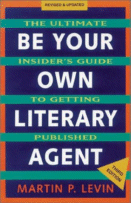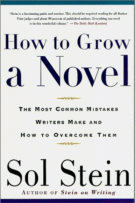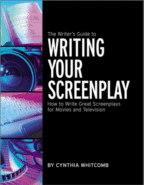Reviews of Writing Books
Be Your Own Literary Agent by Martin B. Levin
Ten Speed Press, February, 2002Paperback, 242 pages
ISBN: 1580083382
Ordering information:
Amazon.com
 This is the third edition of this
book which provides inside information
about the trade business of agents, as well
as practical advice for writers.
This revised edition includes new information
about publishers who accept manuscript submissions,
ebooks, electronic rights and standard
terms used by publishing professionals. Levin
provides information
about the work agents do, and includes explanations of query
letters, cover letters, book proposals (with examples),
and book contracts. The book also
covers another important subject -- money.
In easy to understand language, the author shows you
what makes a poor deal, a fair deal and a good deal when
negotiating a contract for a first novel.
This is the third edition of this
book which provides inside information
about the trade business of agents, as well
as practical advice for writers.
This revised edition includes new information
about publishers who accept manuscript submissions,
ebooks, electronic rights and standard
terms used by publishing professionals. Levin
provides information
about the work agents do, and includes explanations of query
letters, cover letters, book proposals (with examples),
and book contracts. The book also
covers another important subject -- money.
In easy to understand language, the author shows you
what makes a poor deal, a fair deal and a good deal when
negotiating a contract for a first novel.
Martin P. Levin has spent over fifty years in the publishing business and has been involved with top authors including Stephen King, Ken Follett and Erika Jong. Currently, he works for an intellectual property firm and is a professor at the New York University Law School. Levin does a superb job of explaining contracts, rights and legal terms in laymen's terms. Even if you decide not to be your own agent, you will learn so much about the process what agents do that you will certainly make an informed decision when you do choose an agent. Levin's book is jam-packed with exactly the kind of information writers need to get their work published, and get paid for their efforts.
How to Grow a Novel by Sol Stein
St. Martin's Griffin, March, 2002Paperback, 240 pages
ISBN: 0312267495
Ordering information:
Amazon.com
 Editor and author Sol Stein
helps writers learn what they are
doing wrong and provides practical
advice and methods for fixing and
avoiding common writing mistakes.
Sol Stein is a well-known author, writing
teacher and editor. Stein also wrote the popular
writing book,
Stein on Writing.
An editor for top writers such as
James Baldwin, Jack Higgins and Elia Kazan,
Sol Stein really knows his stuff. He's see all of the mistakes
that writers make, and tells you how to fix them.
Stein guides
writers through the writing process, step by step.
Stein teaches writers how to focus on what
the reader needs to get out of a novel; he teaches
writers how to
grab and keep a reader's attention.
In the book he also covers the usual craft of writing topics
like conflict, dialogue, characters and plot ideas, but he also
provides inspiration to keep writers going. For example,
when faced with writers who can't find the time to
write, Stein explains the story of Christy Brown whose life
was the basis of the feature film My Left Foot.
To the writer
with no time to write Stein says,
"He [Brown] wrote his manuscripts one letter at a time
on a special typewriter IBM contrived for him. All the
lines on the occasional letter I received from Christy slid
upwards at an acute angle because IBM didn't figure out
how to make the paper-grip work on the special typewriter.
Christy wrote his three novels and two books of poetry
within a single decade, taking time off to do the Today
Show and the David Frost Show and interviews in England, all
from the wheelchair he was confined to for life. What did you
say your problem was?" This is an exceptional
writing aide -- one that can and should be read
all the way through. How to Grow a Novel is
great book for improving one's writing -- and one's attitude.
Editor and author Sol Stein
helps writers learn what they are
doing wrong and provides practical
advice and methods for fixing and
avoiding common writing mistakes.
Sol Stein is a well-known author, writing
teacher and editor. Stein also wrote the popular
writing book,
Stein on Writing.
An editor for top writers such as
James Baldwin, Jack Higgins and Elia Kazan,
Sol Stein really knows his stuff. He's see all of the mistakes
that writers make, and tells you how to fix them.
Stein guides
writers through the writing process, step by step.
Stein teaches writers how to focus on what
the reader needs to get out of a novel; he teaches
writers how to
grab and keep a reader's attention.
In the book he also covers the usual craft of writing topics
like conflict, dialogue, characters and plot ideas, but he also
provides inspiration to keep writers going. For example,
when faced with writers who can't find the time to
write, Stein explains the story of Christy Brown whose life
was the basis of the feature film My Left Foot.
To the writer
with no time to write Stein says,
"He [Brown] wrote his manuscripts one letter at a time
on a special typewriter IBM contrived for him. All the
lines on the occasional letter I received from Christy slid
upwards at an acute angle because IBM didn't figure out
how to make the paper-grip work on the special typewriter.
Christy wrote his three novels and two books of poetry
within a single decade, taking time off to do the Today
Show and the David Frost Show and interviews in England, all
from the wheelchair he was confined to for life. What did you
say your problem was?" This is an exceptional
writing aide -- one that can and should be read
all the way through. How to Grow a Novel is
great book for improving one's writing -- and one's attitude.
The Writers Guide to Writing Your Screenplay by Cynthia Whitcomb
The Writer Books, January, 2002Paperback, 221 pages
ISBN: 0871161915
Ordering information:
Amazon.com
 This book provides instruction for writing
screenplays and television scripts. The book includes
checklists, practical advice and tips, as well
as excerpts from screenplays. An important
feature in the book is the detailed explanations
of how to format the scripts. The book
explains each portion of the screenplay so
screenwriters understand what each part
means and why it is necessary -- in addition
to basic instruction about how to format a script.
This formatting instruction includes terminology,
page numbering, formatting specifics, headings,
camera directions and even special formatting
techniques, such as if you want to show that
your character is singing. In addition to this special
chapter, the book also includes script examples
throughout the book to help the writer.
Other topics covered in the book include research,
three-act structure, storyboards, characters, conflict,
opening and endings and rights. The book also lists
additional resources for screenwriters and gives
suggestions of movies to rent.
This book provides instruction for writing
screenplays and television scripts. The book includes
checklists, practical advice and tips, as well
as excerpts from screenplays. An important
feature in the book is the detailed explanations
of how to format the scripts. The book
explains each portion of the screenplay so
screenwriters understand what each part
means and why it is necessary -- in addition
to basic instruction about how to format a script.
This formatting instruction includes terminology,
page numbering, formatting specifics, headings,
camera directions and even special formatting
techniques, such as if you want to show that
your character is singing. In addition to this special
chapter, the book also includes script examples
throughout the book to help the writer.
Other topics covered in the book include research,
three-act structure, storyboards, characters, conflict,
opening and endings and rights. The book also lists
additional resources for screenwriters and gives
suggestions of movies to rent.
Cynthia Whitcomb has sold over seventy screenplays and television scripts, and has also taught screenwriting for nearly twenty years at the UCLA Film School. Ms. Whitcomb provides a well-laid out and easy to understand guide, that will surely benefit screenwriters. The book follows Whitcomb's process of writing a screenplay using both your creative right brain and your analytical left brain. The process involves four steps: The Spin, The Heart, The Mind and The Spirit, and the book follows these steps logically allowing the reader to learn Whitcomb's process as well as learn screenwriting methods, tips and tricks along the way. Writing Your Screenplay is packed with good advice and information -- this is a must-have for screenwriters.
Return to Book Reviews Index
More from Writers Write
Stephen King Quotes
quotes from the master
quotes from the master
Grammar Tips
improve your writing
improve your writing
Writing Prompts
spark your creativity
spark your creativity
